BELGRADE, 09.03.2018. – According to the IJAS database of project-based co-financing, from 1 January to 12 December 2017 in Serbia there has been the total of 146 public calls (competitions) on all state levels for co-financing of projects in the area of public information. The total amount of funds allocated for all competitions was 1,292,548,388 dinars (almost 11 million EUR).
| Competitions in 2017 |
Number |
Total value in RSD |
| Republic |
7 |
255,000,000 |
| Provincial |
16 |
70,000,000 |
| Towns and municipalities |
133 |
967,548,388 |
| Total |
146 |
1,292,548,388 |
The Ministry of culture and information published seven competitions (on 14 February 2017) which were realized by the end of June 2017, at the value of 255 million dinars.
The Provincial secretariat for culture and information of the AP of Vojvodina published six competitions realized by the end of August 2017 at the total value of 70 million dinars.
Between 1 January and the end of November 2017, local self-government units (LSG units – towns and municipalities) published the total of 133 competitions at the total value of about 967,548,388 million dinars.
Amounts allocated at local competitions in 2017 in RSD
| The highest amount |
The City of Belgrade |
74,000,000 |
| The lowest amount |
Municipality of Knic |
200,000 |
| Average amount |
|
7,274.799 |
| No. of LSG units below average |
|
39 |
| No. of LSG units above average |
|
94 |
The largest amount was allocated within the competition of the City of Belgrade – 74,000,000, while the smallest was allocated by the competition of the municipality of Knić – 200,000 dinars.
The municipalities of Boljevac, Kovačica, Raška, Bečej, Paraćin, and towns of Novi Sad, Pančevo, and Smederevo published two competitions respectively.
The municipality of Apatin cancelled its competition for the lack of funds, while Požarevac, Bojnik, and Novi Kneževac cancelled public invitations following the warning of the Coalition of journalists’ and media associations (hereinafter: the Coalition) in relation to irregularities. All the four local self-government units later published and implemented correct competitions. However, there was a considerably large number of incorrect competitions which were not rectified even after the warning issued by the Coalition.
Irregularities at competitions
Out of the total of 133 competitions published by LSG units, according to IJAS data, as many as 39 (somewhat less than one third) contained irregularities. The Coalition reacted pointing to the irregularities to the bodies which had published the competitions. The irregularities most frequently related to failure to state the minimum and maximum amounts of funds which could be allocated for individual projects, as well as publicizing of old project application forms (the competent ministry published new forms in the beginning of 2017). In most cases, LSG units rectified the formal shortcomings of the competitions following the warning of the Coalition, while some LSG units turned a deaf ear to the warning, which resulted in public statements of the Coalition about illegitimacy of the competitions and the decision not to nominate candidates as members for the competition board as a result.
The municipality of Novi Kneževac violated legal regulations on several grounds and in the most obvious manner, by limiting the right to participate in competitions only to media outlets which have head offices at the territory of the municipality. Minimum and maximum amounts were also not defined, and the competition was based on the old forms. Besides, the competition was published only on the municipal website, but not in print media. The municipality did not rectify the competition, even after the reaction of the Coalition; this is why the Coalition did not nominate candidates as members of the professional commission. Later, the competition was finally annulled.
The municipalities of Vladičin Han, Majdanpek, and Ćuprija also failed to rectify the irregularities in their competition procedures, despite warnings of journalists’ and media associations.
Following the competition for co-financing of media projects, the town of Loznica published a public invitation for purchase of services in the area of public information. This was publicly condemned by the Coalition, which pointed that by acting so, Loznica contributed to disintegration of laws on public information and media.
The municipality of Kladovo rejected the proposal of the professional commission comprising representatives of representative journalists’ association without any explanation and established a new commission which re-evaluated the projects. The same happened in Smederevo, where a three-member commission was appointed at first, comprising representatives of the Coalition; however, the town council later on appointed a new commission without any explanation, the commission comprising: Ilija Stojanović, RBA representative, Radojica Mali, and Siniša Batalo, as media professionals. Professional CVs of the said individuals were not published, but media reminded the public that Batalo was the “Pančevo scout of the criminal regime Milošević-Marković and teacher of Marxism”. Radojica Mali was a member of one out of the two this year’s commissions in Pančevo, together with Ferenc Berček and Vladimir Jovanović, who were members of numerous commissions notorious for the most disputable decisions on co-financing.
“Expert” commissions and criminal allocations
The largest Serbian journalists’ and media association have for a number of times protested, both jointly and individually, about the manner in which money from town and municipal budgets is allocated for co-financing of media contents of public interest.
The associations assessed, on several occasions, that money from local self-government budgets was allocated only to media outlets close to authorities or those which act as “propaganda machinery of the authorities”, while the commissions comprise representatives of unfamiliar associations who distribute taxpayers’ money “among themselves”, which recalls “criminal conspiracy”.
The key issues lie in incomplete legal regulations, insufficient transparency of competition procedures, absence of evaluation of the process and the approved projects, as well as absence of sanctions for bodies competent in the area of public information in the case of law violation.
What is especially intriguing is the fact that advertising and similar agencies which the public is unfamiliar with get five or six million dinars for projects, which is by two to three times more than the most expensive projects approved at the competitions published by the Ministry of culture and information, implemented by serious media outlets and production houses which pursue investigative journalism after the highest professional standards. Such financial kindliness towards unknown and only just established companies raises serious suspicion that it is a result of interpretation of media laws facilitating use of taxpayers’ money to cover not public, but some private interests, hidden in some clandestine manner.
Obvious favouring of media outlets inclined towards the authorities, covered by so-called expert commissions, is almost becoming a rule. Here it is necessary to mention that competence of some associations whose representatives are almost regularly appointed as members of competition commissions which pass disputable decisions on media financing is very questionable. On the other hand, in the previous year, it was as if candidates of the Coalition of the major journalists’ and media associations (IJAS, JAS, IJAV, ANEM, and LP) were undesirable for local authorities. For example, in the total of 39 competitions published by towns and municipalities in Vojvodina, a member of the Coalition was appointed only in the commissions of Beočin, Bač, Ada, and Čoka respectively.
Big towns are leaders in suspicious, slanted allocations of funds for media projects. Each of the so-far three published competitions of the City of Belgrade was implemented in the manner which tricked the aim of project-based financing. This year, at the Belgrade competition, most funds were allocated to media outlets openly close to authorities, unfamiliar consulting and PR agencies, but newly founded companies as well.
More than 90% of the total amount of 74 million dinars, as was allocated by the competition of the capital, was distributed to pro-governmental tabloid papers, companies in ownership relations with Studio B, unknown or only just founded companies. Somewhat less than one third (23 million dinars) was allocated to Studio B and companies connected to it – Brender d.o.o. and Irik d.o.o. Several million dinar amounts were also allocated to the tabloid papers Alo, Informer, and Srpski telegraf, then Association of Rock Musicians and the music company Sky comm group, as well as two companies (Zofin and Folim) which were only registered several days upon the publishing of the competition.
The beneficiaries of the budgetary funds included but a few media outlets in real terms – the Politika, the Novosti, and FoNet news agency; however, what is telling is the fact that critical media, such as the Danas daily, Vreme weekly, Beta news agency and Association Eutopia have not received a penny. The only project investigating corruption in city administration (by portal Pištaljka) also did not meet the “professional criteria” of the commissions.
Such an outcome, however, was not surprising, having in mind the composition of the competition commission which comprised Ferenc Berček (representative of Radio Advertising Bureau – RAB), Vladimir Jovanović (Association of Journalists and Writers in Tourism), Dragana Milovanović (Association of Sports Journalists), and Marija Stamenić and Nebojša Radošević as the “independent media experts” totally unknown to the media community. Same as in the case of the previous two competitions, the city authorities failed to appoint a single representative of representative journalists and media associations, or any approved media experts to the commission.
Distribution of budgetary funds for media projects in Niš was also marked by pro-governmental media and advertising agencies, including a newly-established company which the commission favoured regardless of that to the detriments of approved media outlets.
This year the City of Niš allocated the amount of 20,5 million dinars for co-financing of projects of local media outlets; out of this amount, as much as 72% was allocated to media outlets close to authorities. The largest amount of money from the town budget was allocated to media owned by Vitko Radomirović ‒ the Narodne novine, TV Belami, and TV Niš (3,7 million). Millions were also granted to TV Zona plus (4,3 million) and the portal bearing the same name (400,000), the real owner of which is Vladan Gašić, son of Bratislav Gašić, vice-president of the ruling SNS party and director of BIA. Financial support for the mentioned media from the city budget was also allocated additionally, indirectly, through projects of some association and the PR agency which was to place content in TV stations, newspapers, and portals owned by Radomirović and Gašić.
Financial support was also extended to IN radio, in family ownership of Maja Raković, president of RAB association, who also manages the Naxi network. Interestingly, her deputy Ferenc Berček, who is at the same time a member of the Naxi network, was also a member of the competition commission in Niš.
On the other hand, the commission in Niš also failed to express interest in the project based on investigation of corruption, which the portal Južne vesti, one of the most prominent Internet media outlets, applied with. Some projects of Beta news agency and City radio, which has numerous audiences, were also rejected.
The members of the competition commission in Niš were the already mentioned Ferenc Berček (RBA), Zoran Veličković (upon proposal of the Association of Journalists from Niš), Budimir Ničić, upon proposal of JAS, and two “media professionals” – Dušan Stojanović and Vladimir Veljković.
Independent Journalists’ Association of Serbia (IJAS) and Independent Journalists’ Association of Vojvodina (IJAV) launched a public protest “because of the scandalously implemented competition of the City of Niš for co-financing of public interest in public information”, assessing that “it is more than obvious that budgetary support, that is, money of citizens of Niš, was allocated to pro-regime media outlets which case about public interest exactly as the reality programmes ‘Couples’, ‘Cooperative’, and ‘Farm’”.
Both this year’s competitions in Novi Sad were also used to award millions to pro-regime media; beside this, considerable money went to marketing agencies.
Following the first competition, where most money was allocated to unknown and newly-established media outlets, the projects which were best-rated at the second competition were those of advertising agencies. Interestingly, the amount of three million dinars was both times allocated for projects of an unfamiliar, newly-established company Media Info Centre, the co-owner of which, Marko Carić, was the mentor for composition of the master’s paper of Tomislav Nikolić, former president of Serbia. It is also quite telling that Carić’s partner in the said company, Vladimir Jovanović, was frequently appointed member of competition commissions throughout Serbia (for instance, in the Belgrade commission).
Not a single commission in Novi Sad included members of any representative journalists’ and media associations. Instead, Dragoljub Anđelković, presented by the pro-governmental media as a political analyst, was appointed member of the commission as a media expert. Beside him, media projects were also evaluated by Biljana Ratković Njegovan, Milovan Balaban, Ferenc Berček, and Željko Rakičević. Finally, the decision on appointment of the commission was not published at the city website.
Public interest for private business
Competitions for co-financing of public interest in media are becoming a very attractive and lucrative business for influential individuals close to authorities, even those who have nothing to do with public information.
According to an investigation conducted by Cenzolovka, newly-established companies Brifing Banat from Pančevo and Brif media net from Novi Sad “collected about 277,000 EUR from citizens of Vojvodina” at the 16 local competitions published in September and October this year. The company Brifing Banat, registered in the beginning of September with the Agency for Business Registers (APR) stated “advertising agency activities” as its dominant activity; in the end of October, company Brif media net was registered with the head office in Novi Sad, with web portals as the dominant activity. With identical start-up capital of 100 dinars respectively, on the same day (5 October) both companies registered with the Register of media the portals juznibanat.rs and brif.rs. As the founders of the said portals, Brifing Banat and Brif media net collected the total of almost 33 million dinars in several months from local competitions for co-financing of media projects. The anonymous portals thus became the best paid authors of media projects in Serbia.
The newly established portals unknown to the public, ePodunavlje, which at the recent competition in Smederevo was allocated seven million dinars, and Balkan produkcija Beograd, which was allocated 4,9 out of the total of 20 million dinars allocated within the same competition, turned out to be very skilful in protecting “public interest” in media content. Interestingly, the Town council of Smederevo originally (on 23 June) appointed as members of the competition commission three representatives of representative associations (IJAS, JAS, and ANEM); however, two months later, it changed its decision and appointed a new commission which passed the said decision.
Public interest without protection
The Law on public information and media and by-law – Rulebook on co-financing of projects for achieving of public interest in the area of public information does not provide for an appeal as a legal remedy against a decision of bodies implementing a competition. The only legal remedy envisaged by legal regulations is launching of administrative proceedings against the decision on allocation of funds for co-financing of projects.
There is no reliable data on the number and outcomes of administrative proceedings launched on the grounds of competitions for co-financing of media content in public interest.
City radio from Niš has so far initiated the largest number of administrative proceedings against decisions on allocations within local competitions for co-financing of media content in public interest. Out of the total of 20 procedures upon claims of this media outlet in 2015 and 2016, the Administrative Court resolved a half of the cases to the benefit of the claimant. The claim of City radio most frequently related to the absence of justification in decisions on co-financing. In all cases, the verdict comprised the order that the public authority body which had published the competition pass a new decision in accordance with law. However, there has been no real satisfaction for the claimant, because competent bodies of LSG units pass new decisions which are identical to the previous ones, except for providing more detailed justification of the decision on allocation. In the course of 2017, only one more claim submitted against the municipality of Negotin was resolved, this time to the benefit of the LSG unit which referred the fact that the competition application of the claimant – City radio – was not duly filled in. In his statement for IJAS, Dragan Kocić, editor-in-chief of City radio, pointed to the fact that the administrative body of Negotin made another legal omission in this case, as it was obliged, having noticed irregularities in the filled forms, to order the applicant to rectify the shortcomings within a certain period of time, which was not done in this case. Interestingly, this is the only case of City radio which was resolved before the Administrative court in Belgrade, while all the previous ones were resolved before the Administrative court in Niš.
“Unfortunately, as a rule, decisions on co-financing do not include any precise justification as to why some projects are supported, i.e. why others are rejected. There is an impression that public interest in media projects is not taken into consideration, but that the financial support is extended to media outlets, which is contrary to the idea and sense of the system of co-financing of media content as prescribed by the Law on Public Information and Media”, assessed Kocić.
The newsroom of the portal Južne vesti has very similar experiences in launching administrative proceedings. So far, they have launched seven lawsuits against decisions of LSG bodies, and got positive court decisions in all cases. In five cases, court decisions were to the benefit of the claimant by annulling the decision passed by administrative bodies of the municipality of Blace (twice), the Town of Niš (twice), and the town of Leskovac, while the case upon claim against the Ministry of culture and information is still pending. On this occasion, Južne vesti also launched the case against the Government of Serbia, for the “silence of the administration”, i.e. for failure to reply to the request for information of public importance, in relation to the competition published by the Ministry of culture and information.
In his statement for IJAS, Predrag Blagojević, editor-in-chief of Južne vesti assessed that this type of legal protection in practice does not yield any results. “We mostly launched proceedings because the decisions on co-financing of projects did not include a justification. We also pointed to conflict of interest of members of competition commissions, as well as some other violations of law, but it is the Constitutional court which, as a rule, decides about formal shortcomings in decisions on allocation. Thus, an opportunity is given to bodies implementing competitions to add some kind of justification in new decisions, not changing any financial item”.
In mid-January 2017, a group of media filed a joint claim to the Administrative Court for the purpose of annulment of the decision passed by the City administration of Belgrade on allocation of funds within the published competition for co-financing of projects in 2016. The claimants were: Beta news agency, the Danas daily, Vreme weekly, Media Centre Belgrade, Radio Oscar, and agencies SL Media and JSP Beograd. It was requested from the Court to postpone execution of the decision on allocation which was passed on 12 December 2016 and by which the amount of 85,750,000 dinars was allocated for co-financing of media projects, which is the largest amount allocated within LSG competitions so far. The claim pointed to serious, obvious violations of law committed in the course of implementation of the competition as a possible cause of material damage for claimants, as well as the City of Belgrade itself.
So far, almost a year later, the Administrative court has not scheduled the first hearing after the said claim.



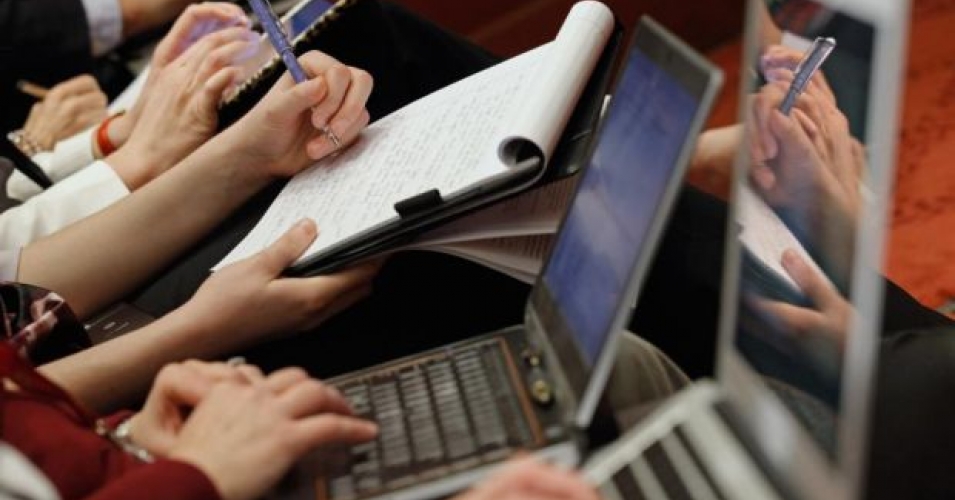
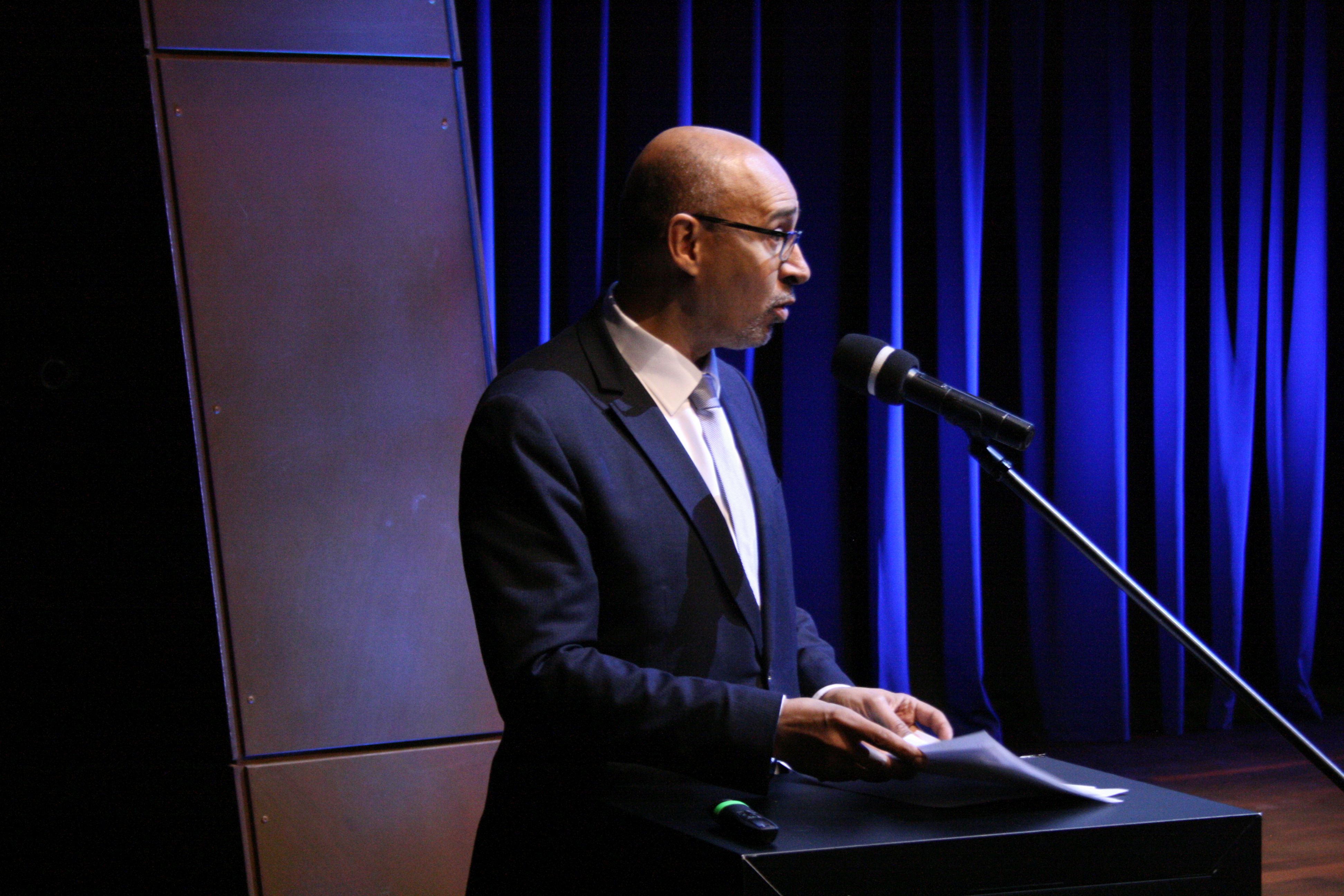
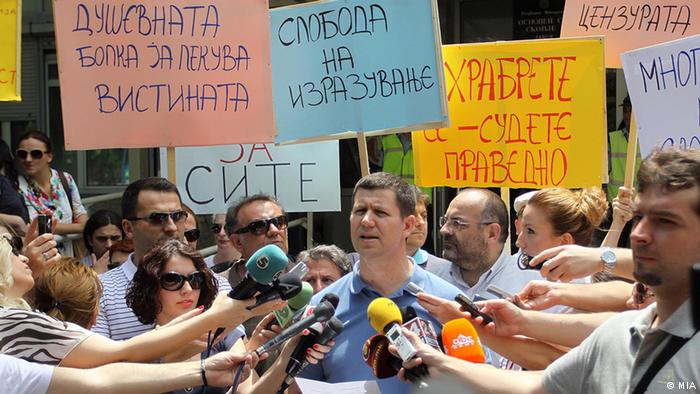
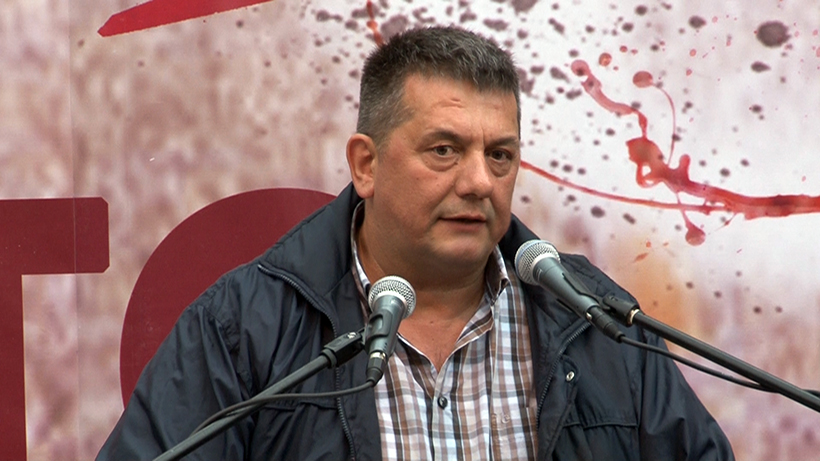
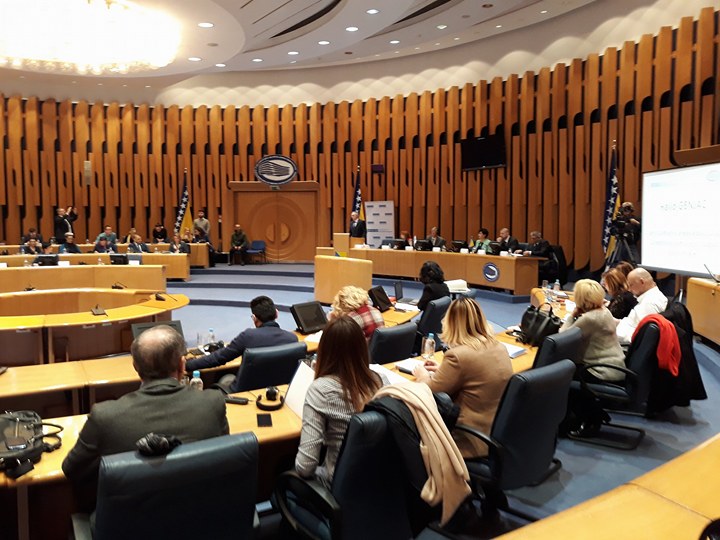
 Halid Genjac, the first deputy chairman of the PSBiH Joint Commission for Human Rights, opened a conference pointing out that in BiH “there is a need to improve the legal framework that prescribes the protection of journalists, as well as the prevention of hate speech as one of the key issues, in advanced democracies and especially in the transition “.
Halid Genjac, the first deputy chairman of the PSBiH Joint Commission for Human Rights, opened a conference pointing out that in BiH “there is a need to improve the legal framework that prescribes the protection of journalists, as well as the prevention of hate speech as one of the key issues, in advanced democracies and especially in the transition “. Communications and Traffic Minister Ismir Jusko stressed that joint action can do a lot to reduce the number of attacks on journalists and that it is necessary to be loud in condemning attacks and acting preventively. He also underlined the obligation of the state to align legislation with EU directives, including those related to the transparency of media ownership.
Communications and Traffic Minister Ismir Jusko stressed that joint action can do a lot to reduce the number of attacks on journalists and that it is necessary to be loud in condemning attacks and acting preventively. He also underlined the obligation of the state to align legislation with EU directives, including those related to the transparency of media ownership. The General Secretary of BHJA Borka Rudić emphesized the importance of official reactions of institutions to the threat of freedom of expression and security of journalists over the past year. „Freedom of Expression is not only a guestion of media community, but a constitutional obligation in BiH. The opening up of institutions to these issues has also resulted with initiatives of state authorities in order to defend freedom of expression, “said Rudić.
The General Secretary of BHJA Borka Rudić emphesized the importance of official reactions of institutions to the threat of freedom of expression and security of journalists over the past year. „Freedom of Expression is not only a guestion of media community, but a constitutional obligation in BiH. The opening up of institutions to these issues has also resulted with initiatives of state authorities in order to defend freedom of expression, “said Rudić.
